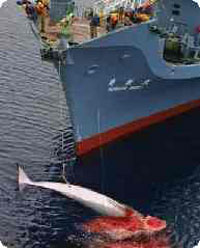Protesters attack whaling ships in Japan
Its last hunt ended in chaos. One whaler died, fire disabled a ship, and protesters had a high-seas field day, shooting smoke canisters onto the fleet's flagship and playing cat-and-mouse with its vessels, all in the pristine and normally serene waters of the Antarctic.

With Japan's whaling fleet once again on its way to the Southern Ocean for its annual hunt, officials are concerned of another showdown - and the anti-whaling group Sea Shepherd has vowed to do whatever it must to stop what it calls the "Cetacean Death Star."
"We have stepped up measures to defend ourselves from possible attacks, although we cannot disclose any details," Hideki Moronuki, the head of the whaling division at Japan's Fisheries Agency, said Monday. "We consider any use of force to stop our legally valid activity as terrorism, and we do not tolerate it."
The six-ship fleet left the port of Shimonoseki last month, and is to return in April.
This season's hunt is particularly controversial because the whalers plan to kill up to 50 humpback whales in what is believed to be the first large-scale hunt for the once nearly extinct species since a 1963 moratorium in the southern Pacific put them under international protection.
The mission also aims to kill as many as 935 minke whales and up to 50 fin whales in what Japan's Fisheries Agency says is its largest-ever scientific whale hunt. Japan claims that all of its whaling is done for scientific research, but critics dispute that claim.
Greenpeace spokesman Junichi Sato said his group is searching for the Japanese fleet, but that its location is not known because the fleet has apparently switched off its radio transmitters "so they cannot be spotted.
"Their activity is conducted secretly to protect themselves from possible attacks," he said. "They shouldn't have to hide to conduct research. Their activities should be more transparent."
Japanese officials have denied the fleet turned off its transponders.
Officials are primarily concerned with the radical conservation group Sea Shepherd, which has vowed to disrupt the hunt in what it has dubbed Operation Migaloo, after an endangered albino humpback.
Sea Shepherd has already launched a barrage of rhetoric against the whalers.
"This year, the sights of the ruthless Japanese harpooners are set square on the endangered humpbacks, meaning that Migaloo and all of his family are under imminent threat of death at the hands of Japanese pirate whalers," the group announced on its home page.
The group has said its ship, the Robert Hunter, will leave port this month to pursue the fleet. Moronuki said the Hunter was expected to leave Melbourne later this week.
"We are obsessed with stopping the Cetacean Death Star, that viciously cruel killing machine otherwise known as the Nisshin Maru, and her ruthless fleet of hunter/killer boats armed with their explosive deadly blunt harpoons," the site quoted founder Paul Watson as saying.
The Sea Shepherd has in the past made good on its threats.
In February, Sea Shepherd ships and a Japanese vessel clashed in the ice-strewn waters of the Southern Ocean. Both Japan and Sea Shepherd claimed their vessel was rammed by the other's, and the Robert Hunter ended up with a 1-meter (3-foot) gash in its stern above the water line.
Japanese officials said the activists threw ropes and nets into the water to entangle the Japanese ship's propeller and prevent it from maneuvering, and threw smoke canisters and garbage onto the deck.
During the clash, two Sea Shepherd crew members went missing for several hours in a small inflatable boat but were later found safe.
Adding further drama to the story, the Japanese hunt ended early after a fire broke out aboard the Nisshin Maru, which is the mother ship, killing one crew member and forcing the fleet back to port.
It is not clear what caused the blaze, but Japanese officials believe it was not related to the Sea Shepherd activities.
The confrontation drew protests from Japan, and even sparked strong rebukes from the strongly anti-whaling governments of Australia and New Zealand.
"Sea Shepherd's protest has gone too far," New Zealand Conservation Minister Chris Carter said. "Any further action on the part of Capt. Paul Watson risks the loss of human life, and severe damage to the cause of whale conservation."
Subscribe to Pravda.Ru Telegram channel, Facebook, RSS!


